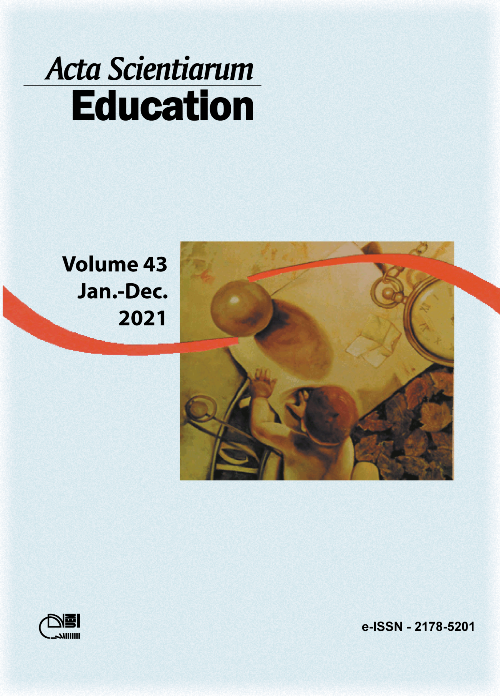Arte-educação e seus desdobramentos à formação pedagógica
Resumo
O texto propõe refletir sobre as contribuições da arte-educação nas experiências pedagógicas para a sensibilização estética, tendo em vista as conversas tensas e os alargamentos de repertórios culturais que põe em jogo os sentidos na atualidade. Essas perturbações se traduzem na desvalorização da dimensão estético-expressiva à construção do conhecimento pedagógico, de percepções rígidas e regradas, gerando a centralização nos conteúdos racionais relacionados às certezas do mundo. Trata-se de uma pesquisa hermenêutica que dialoga com a arte-educação como fonte de indagação para compreender os processos formativos e as ações de humanização dos sentidos e das experiências educativas no campo do desenvolvimento humano. A arte como forma de expressão e educação sensível para pensar a formação expressiva é algo reconhecido cientificamente, que não obedece a convencionalismos, mas provoca atos de liberdade, interação, participação social e motivação dos sujeitos, por meio de diferentes saberes inventivos e bagagens culturais. No entanto, quais as contribuições da arte-educação à formação de professores para dialogar com as experiências artísticas? Concluímos que a arte dá oportunidades à construção de experiências (inter)subjetivas como aventura de se relacionar com o conhecimento que rompe com todos os parâmetros, no sentido de reinventar-se com o outro, trazendo desdobramentos ao processo de (re)criação das relações educativas.
Downloads
Referências
Azevedo Junior, J. G. (2007). Apostila de arte – artes visuais. São Luís, MA: Imagética Comunicação e Design.
Barbosa, A. M. (1989). Arte-educação no Brasil: realidade hoje e expectativas futuras. Estudos avançados, 3(7), 170-182. doi: 10.1590/S0103-40141989000300010
Barbosa, A. M. (2003). As mutações do conceito e da prática. In A. M. Barbosa (Org.), Inquietações e mudanças no ensino da arte (2 ed., p. 13-25). São Paulo, SP: Cortez.
Barbosa, A. M. (2008). Arte-Educação no Brasil (5 ed.). São Paulo, SP: Perspectiva.
Barcelos, P. (2015). Imagem-aprendizagem: experiências da narrativa imagética na educação (Tese de Doutorado). Universidade de Brasília, Brasília.
Benjamin, W. (1975). Textos de Walter Benjamin. A obra de arte na época de suas técnicas de reprodução. São Paulo, SP: Abril Cultural.
Benjamin, W. (1984). Reflexões: a criança, o brinquedo, a educação. São Paulo, SP: Summus.
Benjamin, W. (2002). Sobre el programa de la filosofía venidera. In W. Benjamin (Ed.), Sobre el programa de la filosofia futura: y otros ensayos (p. 8-15). Caracas, VE: Monte Avila.
Brasil. (2002). Estratégias e orientações sobre arte – respondendo com arte às necessidades especiais. Brasília, DF: MEC/SEESP.
Canclini, N. G. (1980). A socialização da arte - teoria e prática na América Latina. São Paulo, SP: Cultrix.
Certeau, M. (1998). A invenção do cotidiano: artes de fazer (3 ed.). Petrópolis, RJ: Vozes.
Cunha, M. I. (1998). O professor universitário na transição de paradigmas. Araraquara, SP: JM Editora.
Duarte Júnior, J.-F. (1994). Por que arte-educação? (7 ed.). Campinas, SP: Papirus.
Eça, T. T. P. (2010). Educação através da arte para um futuro sustentável. Cadernos Cedes, 30(80), 13-25. doi: 10.1590/S0101-32622010000100002
Ferraz, M. H. C. T., & Fusari, M. F. R. (2009). Arte na educação escolar (3 ed.). São Paulo, SP: Cortez.
Freire, P. (1998). Pedagogia da autonomia: saberes necessários à prática educativa (8 ed.). São Paulo, SP: Paz e Terra.
Freire, P. (2003). Professora sim, tia não: cartas a quem ousa ensinar (14 ed.). São Paulo, SP: Olho d’Água.
Freire, P. (2006). A educação na cidade (7 ed.). São Paulo, SP: Cortez.
Gadamer, H.-G. (1983). A razão na época da ciência. Rio de Janeiro, RJ: Tempo Brasileiro.
Gadamer, H.-G. (2005). Verdade e método (7 ed.). Petrópolis, RJ: Vozes.
Van Gogh, V. (1986). Cartas a Theo. Porto Alegre, RS: L&PM.
Habermas, J. (1994). Sobre Nietzsche y otros ensayos (2 ed.). Madrid, ES: Tecnos.
Habowski, A. C., Conte, E., & Trevisan, A. L. (2019). Por uma cultura reconstrutiva dos sentidos das tecnologias na educação. Educação & Sociedade, 40, e0218349. doi: 10.1590/es0101-73302019218349
Han, B.-C. (2017). Sociedade do cansaço (2 ed., ampl.). Petrópolis, RJ: Vozes.
Heidegger, M. (2009). Ser e tempo (4 ed.). Petrópolis, RJ: Vozes.
Kant, I. (1996). Sobre a pedagogia. Piracicaba. SP: Unimep.
Lipovetsky, G., & Serroy, J. (2015). A estetização do mundo: viver na era do capitalismo artista. São Paulo, SP: Companhia das Letras.
Martins, M. C. F. D., Picosque, G., & Guerra, M. T. T. (1998). Didática do ensino de arte: a língua do mundo: poetizar, fruir e conhecer arte. São Paulo, SP: FTD.
Nietzsche, F. (2014). Sobre verdade e mentira no sentido extramoral. In F. Nietzsche (Ed.), Obras incompletas. São Paulo, SP: Editora 34.
Nóvoa, A. (1995). Os professores e a sua formação (2 ed.). Lisboa, PT: Dom Quixote.
Rancière, J. (2005). A partilha do sensível. Estética e política. São Paulo, SP: Editora 34.
Sacristán, J. G. (2003). Educar e conviver na cultura global. Porto, PT: Edições Asa.
Sacristán, J. G. (2005). O aluno como invenção. Porto Alegre, RS: Artmed.
Savater, F. (1997). O valor de educar. Lisboa, PT: Editorial Presença.
This work is licensed under a Creative Commons Attribution 4.0 International License.
DECLARAÇÃO DE ORIGINALIDADE E DIREITOS AUTORAIS
Declaro que o presente artigo é original, não tendo sido submetido à publicação em qualquer outro periódico nacional ou internacional, quer seja em parte ou em sua totalidade.
Os direitos autorais pertencem exclusivamente aos autores. Os direitos de licenciamento utilizados pelo periódico é a licença Creative Commons Attribution 4.0 (CC BY 4.0): são permitidos o compartilhamento (cópia e distribuição do material em qualquer suporte ou formato) e adaptação (remix, transformação e criação de material a partir do conteúdo assim licenciado para quaisquer fins, inclusive comerciais).
Recomenda-se a leitura desse link para maiores informações sobre o tema: fornecimento de créditos e referências de forma correta, entre outros detalhes cruciais para uso adequado do material licenciado.














































